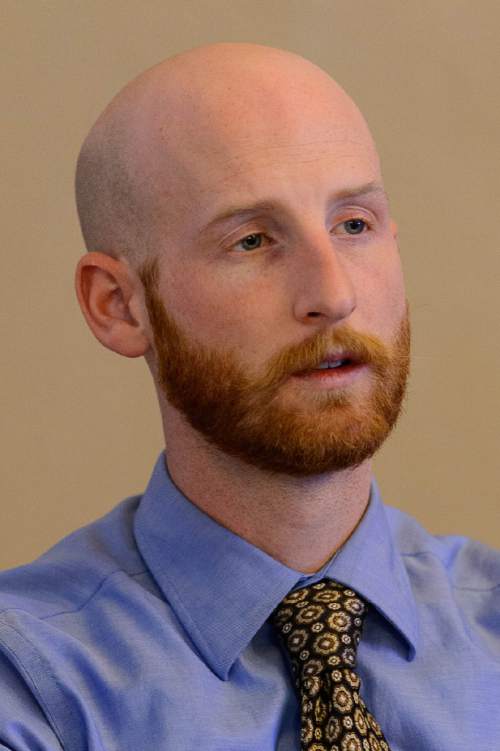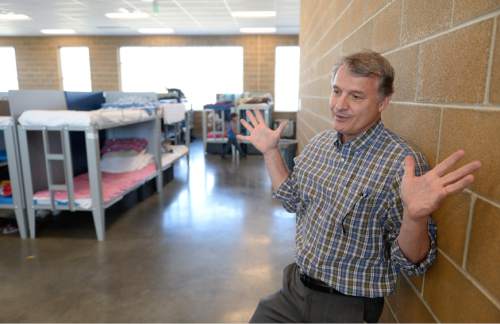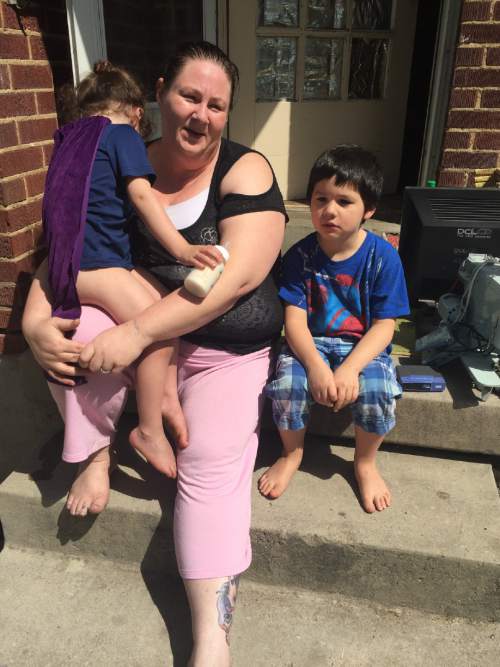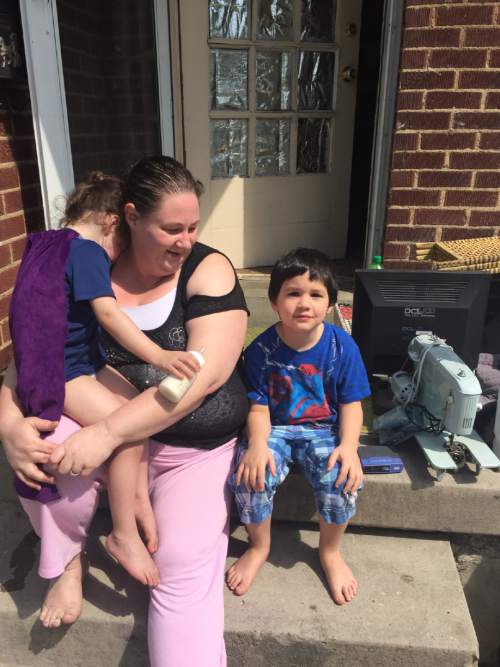This is an archived article that was published on sltrib.com in 2016, and information in the article may be outdated. It is provided only for personal research purposes and may not be reprinted.
It may be hard to imagine that Amy Tabor and her two young sons could be worse off today than when they lived at a homeless shelter.
But they are.
True, they had a home for a while, thanks to a "rapid rehousing" program. But now they are headed back to the shelter and, on top of that, owe thousands of dollars in rent penalties and attorney fees — money they simply don't have.
The family members, including Tabor's fiancé, got a place of their own through The Road Home's program. In November, the foursome moved into a Rose Park duplex. Recently, however, Tabor and her sons were evicted when the 41-year-old mother couldn't make the $850 monthly rent for July.
Their downward spiral began when her fiancé, who held a full-time job, returned to prison on a parole violation.
A lawyer for the property management firm that evicted Tabor said future wages could be garnished to pay the fees and penalties.
Tabor's story is hardly unique, but circumstances like hers are often not reported for a number of reasons, including that the homeless remain nameless and faceless to most — and once they gain housing, it's seen as a success.
The "rapid rehousing" program in which Tabor took part is among the solutions that advocates point to as key to getting homeless people into stable, self-sustaining environments. But the challenges of "rapid rehousing" are many, including a dwindling housing stock and landlords who get top dollar for run-down units.
It's something of a conundrum, said Matt Minkevitch, executive director of The Road Home, which operates shelters in downtown Salt Lake City and Midvale.
"It's a challenge that faces people turning to us and the sort of vice grips they are in," he said. "Any reasonable person wants to get out of the [homeless] shelter as soon as possible."
Those entering the program are responsible for the terms of the leases they sign, Minkevitch added. The Road Home doesn't have the personnel to negotiate leases for them.
Beyond that, Utah has a vacancy rate of only 2 percent, leaving would-be tenants with few options when presented with contracts that outline stiff penalties for late payment for units that are less than perfect.
"We do a basic inspection [of units] to make sure they meet [U.S. Department of Housing and Urban Development standards]. ... But it's not like they are some one-star or two-star rating," Minkevitch said.
In fact, some of the units are horrid, said Salt Lake City Councilman Derek Kitchen, whose District 4 encompasses the shelter on Rio Grande Street at the corner of 200 South.
Kitchen recently visited a woman who had just signed a lease on an apartment that had bed bugs and roaches. He noted that the thermostat was hanging off the wall and air vents were taped over.
"It's not right," he said. "Rapid rehousing works in theory, but living standards should be up to quality standards."
The Road Home pays deposits on housing units, as well as the first three months' rent. In the vast majority of cases, Minkevitch said, those clients do not return to the shelter.
In Tabor's case, the rent on the Rose Park duplex was $850 a month. It was clean and roach-free, although a bit dilapidated when she moved in with her two small children and fiancé.
Tabor's partner landed a full-time job at a mechanic's shop. But in May he was pulled over by police for riding his bicycle on the wrong side of the street, she said. He was carrying a survivalist knife as protection from dogs — a violation of his parole, which landed him back behind bars.
Among the things complicating Tabor's predicament is that she must care for her young boys, one of whom, her 4-year-old son, Leo, has severe cystic fibrosis and requires daily therapy.
Because Leo's immune system is compromised, Tabor said, staying at the shelter poses a significant health risk.
Shortly after the family's eviction, Leo got an infection and was hospitalized at Primary Children's Hospital, where he remained Friday.
Without an income, Tabor could not pay rent July 1. After failing to meet a late notice several days later, eviction proceedings began. When a friend interceded to pay the late rent, Tabor was told that she would have to come up with $1,750 to meet rent and legal fees.
Kirk Cullimore, the lawyer hired by Real Property Management, which manages the duplex, informed her that, according to the lease, she also will owe $84 a day until the duplex unit is occupied.
That could turn out to be expensive, Tabor said, because the other unit in the duplex has been empty since she arrived in November.
"It's ridiculous. I can't come up with that much money," she said. "But I signed the lease."
Cullimore said that if necessary, the fines and fees could be recouped through garnishing wages.
When Tabor's fiancé is released from prison and gets a job, he could be faced with the debt.
It puts people such as Tabor at a great disadvantage, said Aaron Garrett, an attorney at Nonprofit Legal Services of Utah, which charges clients on a sliding fee scale and has represented tenants in such cases. He noted that the vast majority of people being evicted are not represented by legal counsel.
Garrett said Tabor's case is not unusual. Tight rental markets, combined with landlord-tenant laws in Utah, yield a difficult landscape to navigate for people seeking to escape homelessness.
Most are desperate to leave the shelter and enter into unfavorable lease agreements for less-desirable units, Garrett said.
Once rents are missed, fees and penalties pile up, making it practically impossible for the tenants to catch up.
The rapid-rehousing program can be valuable, he added, but some would-be tenants don't have the sophistication or negotiating power to enter into reasonable leases.
"The entire Road Home [rapid-rehousing] project hinges on people getting stability in a short window," Garrett said. "If they have one roadblock, they are back on the street with a judgment against them."
Salt Lake County's "Collective Impact" initiative will rigorously analyze the rapid-rehousing model and other homeless services, according to Mayor Ben McAdams.
The county, Salt Lake City, private-sector service providers and donors are working to remake homeless programs and services. Earlier this year, the Utah Legislature funded the effort with $9.7 million. McAdams hopes similar funding will continue for the next two years.
Rapid rehousing will play a significant role as public- and private-sector advocates move away from a shelter-based system, the mayor said. But successful rapid rehousing will require case management and oversight.
A one-size-fits-all system, McAdams said, allows people to "slip through the cracks."









